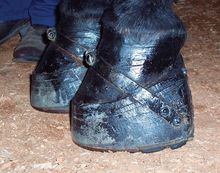Court documents reveal a Fayette County Grand Jury has indicted infamous horse abuser Jackie McConnell and two co-defendants on 38 counts of animal cruelty for illegally soring and torturing horses as documented in a Humane Society of the United States undercover investigation conducted in 2011.

Tennessee Walker hooves - Built-up shoes and pressure bands
Fayette County Grand Jury has indicted infamous horse abuser Jackie McConnell and two co-defendants on 38 counts of animal cruelty for illegally soring and torturing horses.
© 2013 by Todd Behre
A nationally recognized walking horse trainer, McConnell is now notorious for horse abuse following a federal felony conviction for conspiracy to violate the Horse Protection Act. McConnell has been indicted on 22 counts of animal cruelty in Fayette County, for charges stemming from shocking footage captured by an HSUS investigator of McConnell and his associates brutally beating horses and using painful chemicals on horsesâ legs in a cruel practice known as âsoring.â
Soring is the method trainers use to force Tennessee walking horses to perform the exaggerated, artificial gait known as the âBig Lick.â McConnell is already serving 3 years of probation and has been fined $75,000 for his federal felony conviction.
âWe commend District Attorney General Mike Dunavant and Assistant District Attorney General Mark Davidson for filing criminal charges against McConnell and his co-defendants âthe first case of its kind in Tennessee,â Keith Dane, director of equine protection for The HSUS. âUnfortunately, the owners who placed their horses in McConnellâs training stables have not expressed the slightest regret or remorse for the torture these animals endured, and still need to be held accountable.â
McConnellâs co-defendants in the federal case, John Mays and Jeff Dockery were also indictedâMays was charged with 13-counts and Dockery with 3-counts. Both men pleaded guilty to lesser charges in federal court for their role in the conspiracy to violate the Horse Protection Act.
Since 2011, The HSUS has assisted the U.S. Attorneyâs Office for the Eastern District of Tenn., the U.S. Department of Agricultureâs Office of the Inspector General, and the Tennessee 25th Judicial District Attorney Generalâs Office in prosecuting the offenders and assisting in the rescue of horses from McConnellâs training operation.
In March 2012, eight horses were seized from McConnellâs stable following the execution of a search and seizure warrant. At the stateâs request, and at great expense, The HSUS has been providing the horses with intensive rehabilitative care for the past year and will continue to do so.
Background of Tennessee Walking Horse Soring Case:
- Footage obtained by The HSUS of the abuse inflicted upon horses in McConnellâs training facility during its investigation was aired on national television in May 2012 by ABCâs Nightline, sparking national outrage, and condemnation of the practice of soring by the American Association of Equine Practitioners (AAEP) and lawmakers who were rightly appalled by the abuse documented.
- In the last session of Congress, Reps. Ed Whitfield, R-Ky., and Steve Cohen, D-Tenn., introduced the Horse Protection Act Amendments of 2012, which would end the failed system of industry self-policing, ban the use of certain devices associated with soring, strengthen penalties, and hold accountable all those involved in this cruel practice. The bill is expected to be reintroduced with broad support in the coming weeks.
- Tennessee State Sen. Deloris Gresham, who represents the district where the HSUS investigation of McConnell took place, has filed an anti-whistleblower bill that would prevent similar investigations from being conducted in the future. The HSUS opposes S.B. 1248, which is a thinly veiled attempt to suppress the work of whistleblowers and prevent public discussion and transparency about the treatment of animals in the walking horse and other industries.
- The HSUS filed a legal petition asking USDA to treat the use of illegal numbing or masking chemicals on horsesâ legs as a felony under the Horse Protection Act.
- USDAâs Animal and Plant Health Inspection Service conducted random testing at various Tennessee walking horse competitions in 2011, and the results indicate that a shocking 97.6 percent of the samples tested positive for prohibited foreign substances (including numbing agents and drugs that mask evidence of abuse). In 2010, 86 percent of samples tested positive. The results of the agencyâs testing in 2012 have yet to be made available to the public.
- Since July 1, 2012, Tennesseeâs new felony aggravated cruelty to livestock law has created a Class E felony for any person to apply âacid or other caustic substance or chemical to any exposed area of an animal or forcing the animal to ingest the substance,â if such activity is carried out in a âdepraved and sadistic manner.â
